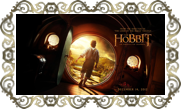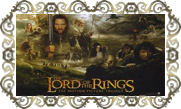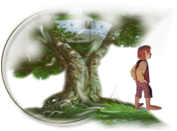

| Once upon a time, namely around the year 2000, several polls consistently declared that J.R.R. Tolkien was "the most influential author of the century," and The Lord of the Rings even "the book of the century." J.R.R. Tolkien got recognized for The Lord of the Rings and for The Hobbit and many exciting reporters jumped on the wagon and everyone wrote about all things Tolkien. What we all knew of course was that there was a general excitement, since we had learned that a director called Peter Jackson was about to do the impossible, namely turn Tolkien's books into movies! |
Now, so many years later, we can still see the result of the sudden interest, but somehow we also realise that the trend is now much smaller then it used to be. It is however difficult to measure, so I thought the following graphs by Google Trends were very useful.
While Peter Jackson's The Return of the Ring came out on 17 December 2003, according to Google Trends interest in The Lord of the Rings was still extremely high at the beginning of 2004. Sadly we don't have data from before and during the release of the three The Lord of the Rings movies, but it is clear that interest must have been impressive and in fact much higher then now with The Hobbit movies.
According to Google "the numbers on the graph reflect how many searches have been done for a particular term, relative to the total number of searches done on Google over time. They don't represent absolute search volume numbers, because the data is normalized and presented on a scale from 0-100. Each point on the graph is divided by the highest point, or 100."
When we look at the averages we can clearly see that The Lord of the Rings scores far better then The Hobbit, and that the author J.R.R. Tolkien is far less searched for compared to the works he created. The good news however is that The Hobbit and Tolkien are getting trendy again and so interest is slowly rising once more. The release of The Hobbit movie caused a big spike of interest, but as you can see interest dropped like a bomb after people saw the film. That probably also explains why this time around we don't see hundreds of fan sites being created, thousands of discussions going on and massive fan events being organized. While interest is rising again, we can not say it has the same impact as we saw during The Lord of the Rings movie period.
Interesting however we can see that interest in The Hobbit book sort of follows interest in The Hobbit movie. If there are actually more people reading the books we don't know, but we can see that when The Hobbit trailer was released a lot more people searched for the book and the same happened when the movie came out. According to Google Trends we have on average 7/1 searches for the movie versus the book. That alone is very interesting!
What I'm however most interested in is where the Tolkien fans are living. According to Google Trends the biggest Tolkien fans live in Norway, followed shortly by Czech Republic, Poland, Sweden, Finland, Croatia and United States. One would expect a country like United Kingdom to top the list, but this is not the case. The Hobbit and The Lord of the Rings show however similar results with most searches done in New Zealand followed to the United Kingdom and United States, clearly these countries are far more into movies then authors!
The bigger question is, how will J.R.R. Tolkien do in several years? How does he as an author compare to for example the English poet William Shakespeare (the second most popular author after Martin Luther King - according to Google)? Well, also here Google Trends can give us answers. On average we can see for every 46 searches for Shakespeare there is 1 search for Tolkien, however interest in Shakespeare is getting lower of the last few years and Tolkien is very slowly closing the gab. One could argue whether Shakespeare is slowly getting less popular or Tolkien is getting more interesting. Only future will tell.
So there you have it. Google Trends tracks searches and shows spikes at the correct moments. We can clearly see that because of The Hobbit movies the interest in J.R.R. Tolkien is slowly rising, but not nearly as much as during The Lord of the Rings period. We can also see that The Hobbit interests far less people compared to the bigger epos and that except for one big spike we can not say that a lot has changed. I wished more data was around and we could get into finer details, but for now I'm happy to see that interest into J.R.R. Tolkien is very slowly growing. And to a positive thinker like me that truly makes my day!
Thanks to a tip from Simon Cook (see comments below) we can look into another data set that is much bigger (in time) then Google Trends. When you enter phrases into the Google Books Ngram Viewer, it displays a graph showing how those phrases have occurred in a corpus of books (e.g., "British English", "English Fiction", "French") over the selected years. We opted for this initial test to enter "The Lord of the Rings", "The Hobbit" and "J.R.R. Tolkien" and the result is fantastic. Not only does it confirm that The Lord of the Rings is much bigger compared to The Hobbit, it also shows us much better that interest into Tolkien is indeed rising again.
Since this article is actually about Tolkien, I thought it interesting to isolate his name and see results between 1930 and 2008 from the corpus English Fiction. There we can see a massive rise in interest into Tolkien from around 1960 up to 1979, followed by an even impressive dramatic drop. The centenary celebrations in 1992 stopped the drop and from there we see interest slowly rise again. Even The Lord of the Rings movie adaptations by Peter Jackson did not bring interest into Tolkien up to his maximum again, but we can clearly see that between the first three movies and the release of The Hobbit interest in Tolkien was falling again. If Tolkien was a brand and we could by stock in him good times seem to be coming again, but how long will it last?
Spread the news about this J.R.R. Tolkien article:














